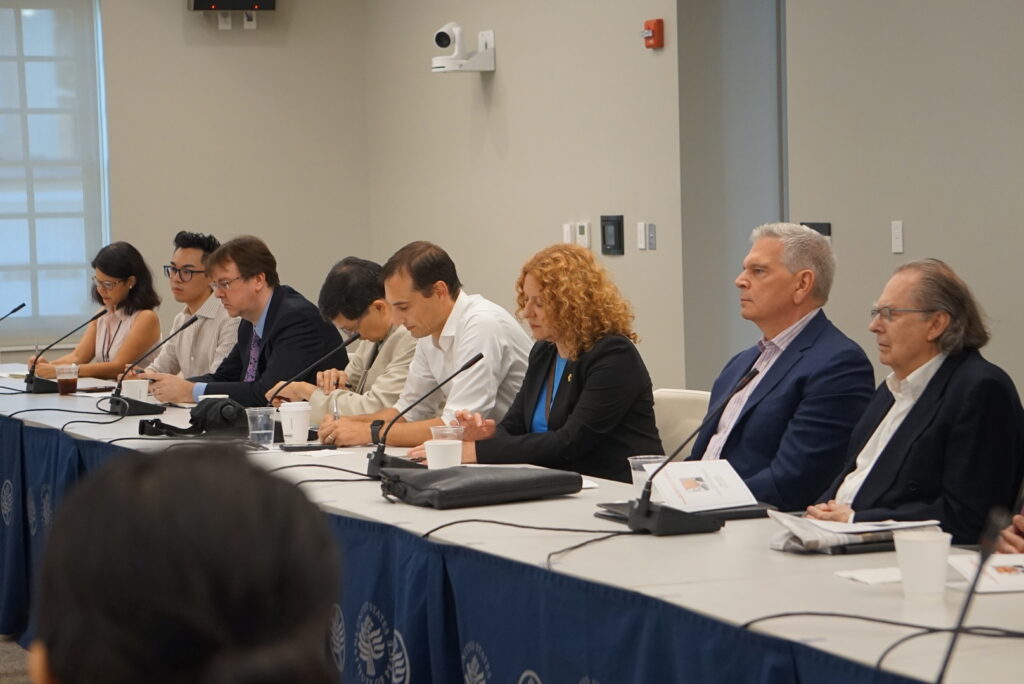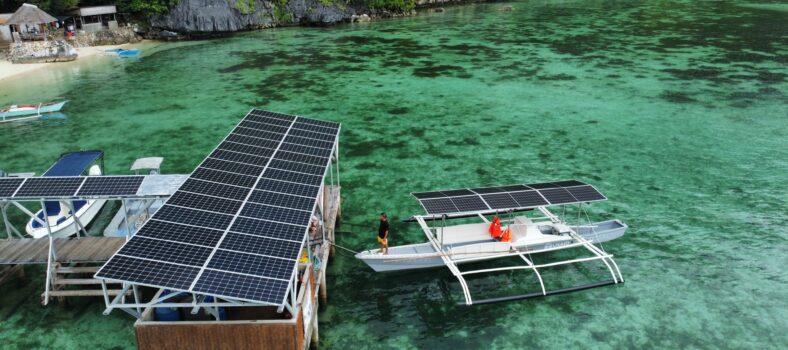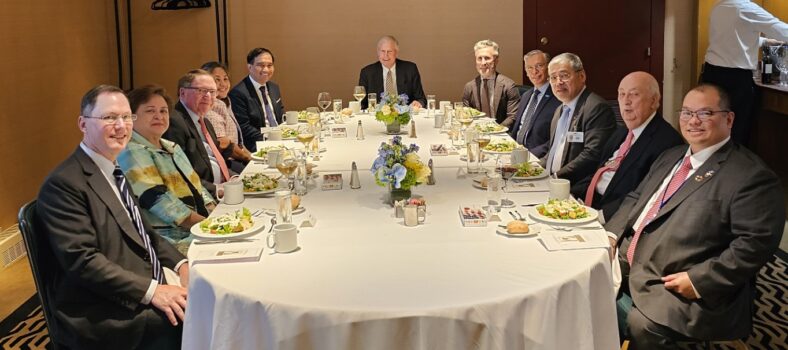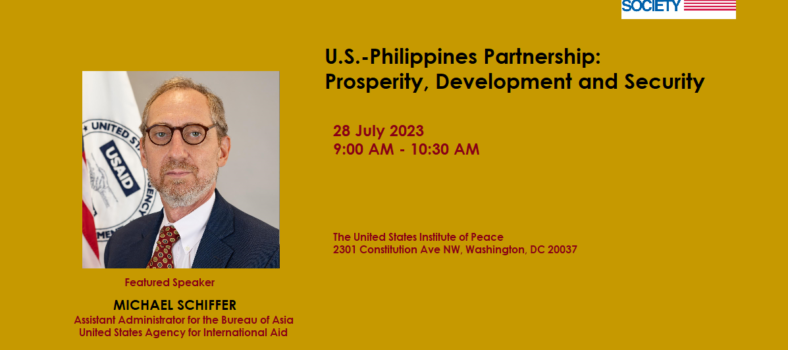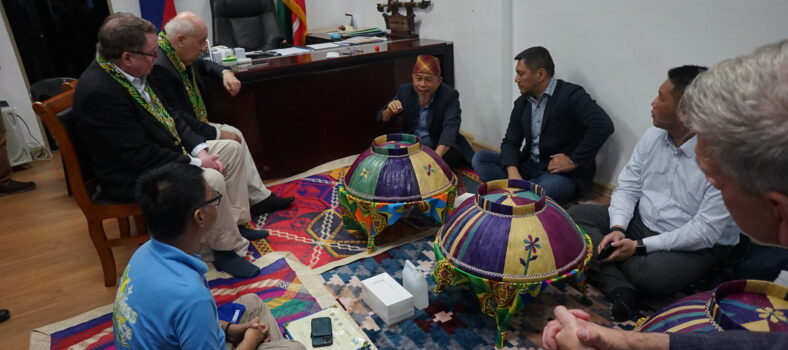Strengthening the U.S.-Philippines Alliance: A USAID Perspective
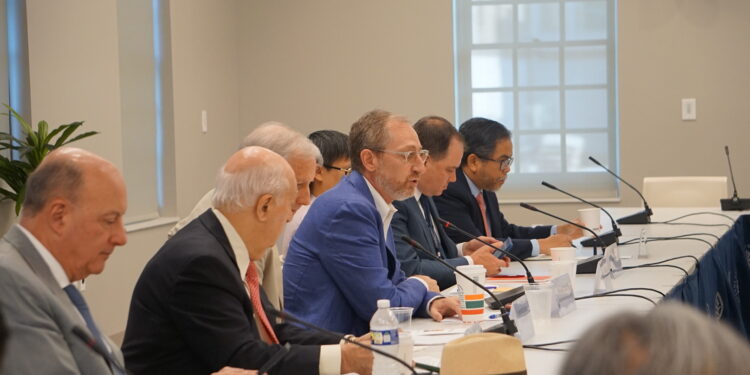
At a July 28 roundtable discussion, USAID Assistant Administrator for Asia Michael Schiffer, provided insights and an outlook on the breadth and depth of U.S.-PH development partnership initiatives, addressing challenges to food security and energy conservation, and the health and socioeconomic well-being of vulnerable communities in the Philippines. U.S. Institute of Peace Senior Program Officer Kayly Ober presented findings on the nexus of climate change and conflict in the Philippines.
AA Schiffer identified key project priorities and stressed the importance of working with local community leaders, civil society, the private sector, government partners and other development stakeholders. Priorities include promoting economic competitiveness and inclusivity to boost trade, productivity and participation in regional trade agreements, providing assistance in the management of natural resources including critical minerals and adoption of mitigation measures to manage the impact of disasters, encouraging responsive governance, promoting peace, and improving the health system in the Philippines. The projects are designed to be sustainable and aligned with the Philippine development agenda, contributing to regional stability, a key component in a free, open, and prosperous Indo-Pacific region.
On his first official visit to the Philippines, June 16-20, AA Schiffer witnessed how these projects empower local communities. He toured a city jail where drug users undergo community-based rehabilitation and recovery support to reduce or prevent drug dependence under the RenewHealth, a USAID collaboration with the Bureau of Jail Management and Penology.
In a Palawan subterranean river park, AA Schiffer witnessed the teamwork of indigenous communities with environmental law enforcers to protect and conserve biodiversity and improve resource management. In Puerto Princesa, he commended women environmentalists participating in the Clean Cities Blue Ocean program and championing sustainability through effective waste collection. AA Schiffer attended various meetings with fishermen, civil society leaders, and the Kalayaan Island Group officials listening and discussing sustainable fishing practices and solutions to address illegal, unregulated, and unreported fishing in the Philippines’ Exclusive Economic Zone. He met with officials of the Philippine Coast Guard aboard BRP Teresa Magbanua to learn about its vital work in protecting marine resources, a major source of livelihood in fisherfolk communities.
Building on these relationships, AA Schiffer stated that USAID launched a new partnership with local stakeholders to support traditional livelihood and sustainable fishing practices. Working with the PH Bureau of Fisheries and Aquatic Resources, the project will expand the use of illegal unreported fishing index and threat assessment tool in municipal waters and fishing areas in the West Philippine Sea. The tool used by almost 30% of local government units across the Philippines helped safeguard and protect about two and a half million hectares of ocean waters.
During his visit in Northern Luzon, AA Schiffer announced $1.6 million in grants under the USAID $34 million Energy Secure Philippines to support energy security and conservation in the provinces of Cagayan and Isabela. With the grant, USAID will provide renewable energy technologies including mobile solar photovoltaic generator for emergencies, solar rooftops, and capacity building programs for local government. Communities surrounding the Enhanced Defense Cooperation Agreement (EDCA) sites in Lal-lo and Santa Ana will also benefit from the grants.
During AA Schiffer’s meeting with the Agta Indigenous Peoples community in Cagayan province where he launched “From Ridge to River” project, he learned of their needs and perspectives to best manage natural resources. Relating the commitment of USAID to indigenous communities, AA Schiffer described how USAID has supported clearing operations and rehabilitation of a damaged forest trail and power line in another community which depends on environmentally sustainable tourism as an alternative source of livelihood.
AA Schiffer laid out various new initiatives including a partnership with the Philippine government to control the rise in tuberculosis cases, train and deploy healthcare workers in rural and remote areas, and expand community-based drug programs to the national level.
A 5-year e-commerce project will expand small and medium enterprise participation in the digital economy, integration of e-commerce platforms into the logistics supply chain and increase the use of E payment systems. In partnership with Asia Open RAN Academy, the U.S. will establish a brick-and-mortar Open RAN Interoperability Lab in Manila to turn the Philippines into a high standard open hub for Southeast Asia, to provide technical training in 5G and future 6G networking and telecommunications, and a testing facility for new technologies serving U.S., Philippines, other Asian and European companies.
AA Schiffer’s visit to the Philippines highlighted the Biden administration’s commitment to the U.S.-Philippines alliance, and U.S. engagement on shared development priorities with the Marcos administration.
“I have to say my visit leaves me extraordinarily optimistic about where we are in our relationship and about the significant upside potential that we have at the USAID, as we look at the development part of diplomacy and the extraordinarily constructive and forward leaning partner in the Marcos government, and we saw some of that when President Marcos visited the United States earlier this year,” AA Schiffer remarked. Furthermore, he noted that in the past year, engagement with the Marcos administration rests on the elements of transparency, human rights and commitment to democratic institutions.
Having been to the Philippines, AA Schiffer stated that he has “confidence in the mission and operations of USAID, and the U.S. ability to continue to make good on its commitments to the Filipino people.”
USIP Senior Program Officer Kayly Ober shared her views on how climate change amplifies existing sources of economic and social risks that could elevate to conflicts. Citing a World Bank study, she reported that extreme weather and rising temperatures will translate to the Philippines economic output loss of 13.6 % by 2030. The slow recovery of certain fish species and change in species patterns have led Filipino fishermen to farther areas like Palau where they were stranded and captured. Climate change also affects how farmers adapt in conflict areas and tensions around natural resources that includes nickel mining.
In an open forum that followed, AA Schiffer addressed concerns of USPHS Director Henry B. Howard around the societal impact of military personnel in the EDCA sites. Since early 2023, USAID has conducted constructive consultations with the office of the Secretary of Defense, U.S. Indo-Pacific Command, the Philippine government and local communities to ensure that the relationship is built under friendly and equitable terms.
In the Bangsamoro Autonomous Region of Muslim Mindanao, AA Schiffer described ongoing USAID research activities focused on improving the policy environment for land, housing, property, energy, women empowerment, and connectivity to spur public investment, economic activity and job creation, reinforcing a cycle that allows for peace to prevail.
AA Schiffer remained confident that congressional funding will be available for expansion of educational scholarships under study abroad and student exchanges in collaboration with universities in the Philippines. USAID projects will also support curriculum reform that is responsive to demands for a 21st century workforce including in the health and seafaring industries.
With his extensive experience serving in senior positions in the U.S. government and with expertise in Asia-related issues, AA Schiffer is leading USAID’s commitment to Philippine development in coordination with various U.S. agencies including the Department of Commerce, Coast Guard, Department of Agriculture, the State Department and others, to provide assistance and aid within the framework that advances democratic values.
In closing remarks, Ambassador John F. Maisto extended the Society’s support and advocacy for USAID’s work and expressed confidence in AA Schiffer’s leadership. He also thanked co-host U.S. Institute of Peace for their programs in Mindanao and the ADB, a development partner in major infrastructure projects. Alain Borghijs, Deputy Representative of the ADB’s North American office, participated in our July 28 forum at USIP.
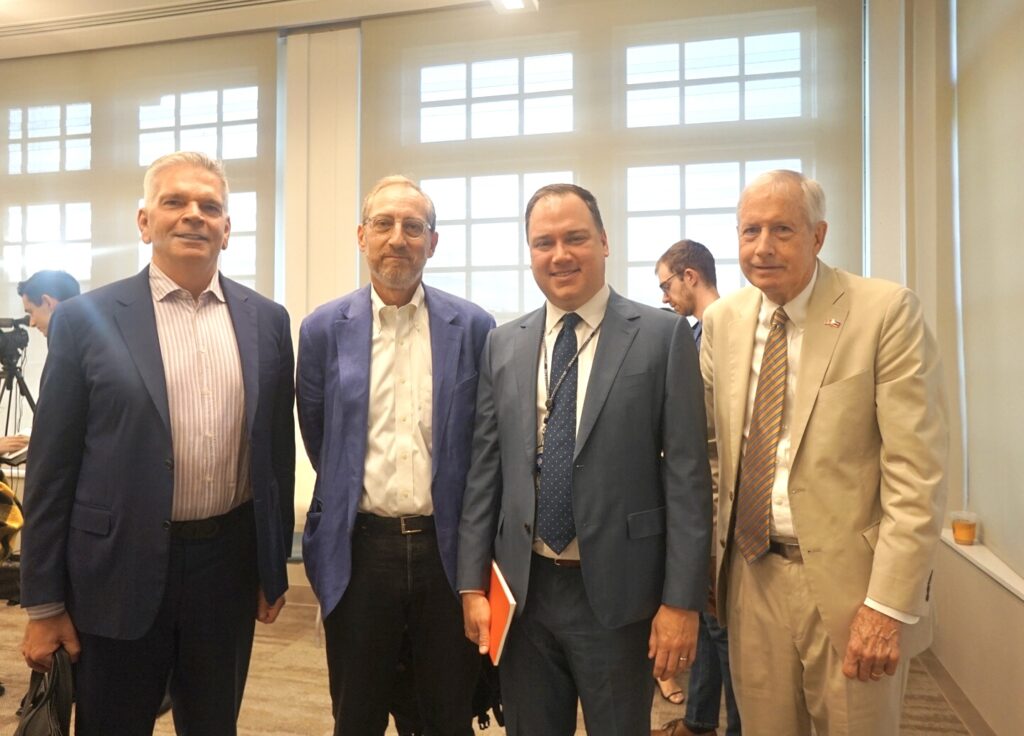
USAID Assistant Administrator Michael Schiffer (second from left) is joined by (l-r) USPHS Director Earl Gast (URC), Brian Harding (USIP), and Executive Director Hank Hendrickson (moderator), 28 July, 2023. U.S. Institute of Peace, Washington DC.

